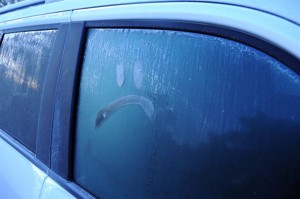 Dear C;
Dear C;
I dread the coming winter. I work out of my home and every year, I struggle with carb cravings, depression, fatigue, weight gain … you name it. No matter what I do, I put on 5 pounds and find myself immobilized on the sofa, wrapped in a blanket to stay warm. It takes me half the day to wake up and as soon as it gets dark, I want to go back to sleep.
A friend of mine said she thinks I have SAD. She’s been taking antidepressants for it. Should I should see a therapist and get a prescription?
Debra Dark
Dear Dark;
You do seem have the classic symptoms of Seasonal Affective Disorder (SAD), and you are certainly not alone. An estimated 10 million Americans are affected each year; another 20% experience milder forms of it. As a woman, you are four times more likely to have SAD than men. Some people have symptoms so severe that it affects their quality of life. If you spend your winters cowering on the couch, you may be one of these individuals.
But if you are functional the rest of the year, I’d strongly caution against treating SAD as a psychiatric disorder and slapping a Band-aid of antidepressants on your symptoms. As Americans, we tend to see our difficult moods as “mental disorders” when what we really need to do is learn better coping skills. I doubt you need pharmaceuticals. Most problematic emotions could be treated just as effectively using common sense.
First, let’s put SAD in context. In the animal kingdom, many animals hibernate in the winter – bears, hedgehogs, bats and even your pet hamster will nestle down for a long winter’s sleep. We are animals too, and it is natural for humans to respond to the change in temperature and light by going to bed earlier and storing some body fat. It’s not unusual for us to gain weight when the temps take a dive – that extra layer of fat provides much-needed insulation. If all you gain is 5 pounds, I’d call that a healthy response to climate change, not a weight problem.
You may want to do nothing but curl up in a quilt to stay warm, but try fighting that instinct. The less you move, the colder you feel. You would be shocked at how quickly you warm up if you hop on an elliptical or stationary cycle and get your blood moving. Exercise is also one of the best natural remedies for depression, and outdoor sports would provide the additional benefit of exposure to sun. And it’s not a bad idea to take vitamin D – sun exposure is how your body naturally produces this nutrient. When we are covered head to toe every time we step out the door, we don’t catch many rays.
Medically, the jury is out as to the exact cause of SAD; there are probably several factors. It may be related to melatonin, a hormone secreted by the pineal gland. When the winter days get shorter and darker, melatonin production increases and we all feel sleepier and more lethargic. Light therapy has been very effective in treating SAD, but staring at a bulb isn’t going to do it. You need a full spectrum light box and you need to follow the directions carefully. Research has found that the most effective time to use light therapy is in the morning. SAD is thought to cause a “phase-shift” of our circadian rhythm, and bright light in the morning resets our circadian clock.
If you work out of your home, you really need to make an effort to connect with community. Isolation tends to breed depression and anxiety. Getting a part-time job isn’t a bad idea to get you out of the house, but that’s work. You need fun and play – it’s more important that most adults realize. Don’t know where to start? When the first good storm comes, get out there and make snow angels.
If you give it your best and still feel like crap, consider a support group. Just talking to others who are experiencing the same problems can really help. Know any other work-at-home professionals? Gather a circle and share your challenges. Want to join an organized effort? Butler Hospital has a peer-run support group for anxiety and depression. Don’t just take SAD sitting down. Making the effort to take control is often the best therapy there is.



